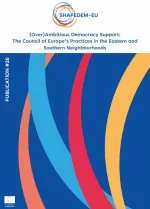(Over)Ambitious Democracy Support: The Council of Europe’s Practices in the Eastern and Southern Neighbourhoods

SHAPEDEM-EU Publications 26
The Council of Europe (CoE) is a pivotal regional organisation dedicated to promoting democracy, human rights, and the rule of law in Europe. Established post-World War II, the CoE has expanded to include 46 member states, encompassing many former Soviet republics. Its primary mechanisms for democracy support involve exporting norms through standard-setting and legal interpretations, rather than direct policy impact. The CoE's influence is particularly evident in its Eastern Neighbourhood, where member states are bound by treaty obligations, unlike the Southern Neighbourhood, where engagement is voluntary. The CoE's discursive practices vary significantly between the Eastern and Southern Neighbourhoods. In the East, the CoE frequently addresses democratic developments, as seen in responses to events in Armenia, Georgia, Ukraine, and Moldova. In contrast, the Southern Neighbourhood receives less attention, with notable engagement only during the Arab Spring and subsequent democratic backsliding in countries like Tunisia. The CoE's behavioural practices, such as National Action Plans and election observations, are more consistent across both regions, focusing on legal and policy expertise. The CoE's relationship with the EU is marked by extensive cooperation, particularly through joint programs like the Partnership for Good Governance and the Southern Programme. These initiatives aim to promote democratic values and human rights, with the EU providing significant financial support. However, the CoE's more inclusive approach sometimes leads to cooperation with non-democratic regimes, raising concerns about legitimising autocratic tendencies. In addressing cross-cutting issues like gender equality and digital transformations, the CoE's conventions, such as the Istanbul Convention on violence against women and the Budapest Convention on cybercrime, offer frameworks for legal and policy reforms. These conventions, while voluntary, become legally binding upon ratification and entry into force, influencing democratic practices in member states. Overall, the CoE plays a unique role in democracy support, leveraging its legal expertise and standard-setting capabilities. However, its cooperation with non-democratic states and the lack of clear distinctions from the EU's policies present challenges. The CoE's future direction, especially in the Southern Neighbourhood, remains uncertain, but its commitment to democracy support is evident in its ongoing efforts and the recent Reykjavik Summit.